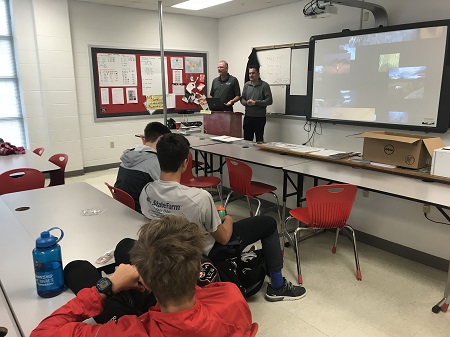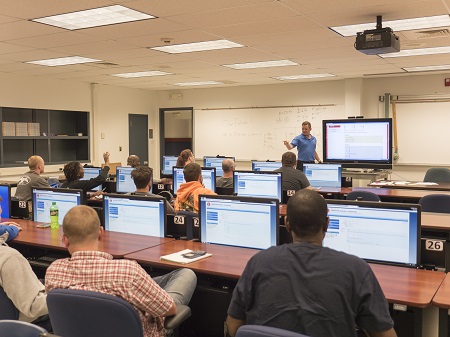 ElectricalConnection.org
ElectricalConnection.org
Connect with Us:
Facebook
LinkedIn
Twitter
YouTube
ST. LOUIS – Coming to a high school near you – a fresh look at careers in the construction industry, one that positions training as higher education. The International Brotherhood of Electrical Workers (IBEW) Local 1 is engaging students throughout the region on the growing complexities of the electrical and communications industry that shape the higher education at the IBEW/NECA Electrical Industry Training Center. Except this higher education is free and offers students the opportunity to earn a living with benefits in a profession that is in high demand.

The new approach unfolded on Oct. 15, 2018 when IBEW Local 1 Business Representative Chuck Demoulin was invited to a “College and Careers” class at Herculaneum High School in Herculaneum, Mo. “We understand and appreciate the attraction of a college education,” said Demoulin. “But we offer the state’s oldest and most successful higher education program serving the nation’s growing need for skilled and safe electricians and communication technicians. Our students immediately embark on a high-tech career with limitless possibilities. Our graduates earn a great living and many go on to become not only electricians and communication technicians, but engineers, project managers and entrepreneurs operating their own union electrical contracting business.”
The industry-funded training center is located at 2300 Hampton Ave in St. Louis and offers 10,000 hours and five years of instruction, including training in the field where students are paid with benefits. Students are engaged in the full breadth of the rapidly evolving electrical and communications industry. The more than 70-course curriculum uses advanced technology including a rooftop solar array and courses on Building Information Modeling (BIM) and next generation electrical/communication installations.

“It’s well documented that Missouri’s economic future is heavily dependent on a skilled workforce,” said Demoulin. “So we have consistently invested in our apprenticeship education to build dynamic careers in an industry that is changing our world. The digital age, smart cities, smart infrastructure, advanced manufacturing, traditional and renewable forms of energy all ultimately require a highly skilled and safe electrician or communication technician to build.”
Demoulin points out that IBEW’s investment in promoting construction careers includes a partnership with the St. Louis Chapter, National Electrical Contractors Association (NECA) called the Electrical Connection. The Electrical Connection has become an important resource to Missouri economic and workforce development organizations. It serves on the Missouri Governor’s Workforce Development Task Force, the “Talent for Tomorrow” program and the “Best in the Midwest” economic development strategic planning initiative.
“With our NECA partners we’ve been investing in developing pacesetting skills and safety for more than 75 years and today it’s a $3 million annual investment,” said IBEW Local 1 Business Manager Frank Jacobs. “We even have an education partnership with St. Louis Community College that offers courses to attain a college degree.”
The training center has a graduation rate of 90 percent thanks in part to a mentoring program that helps students with the robust curriculum. “Our advice to anyone interested in our training program is focus on STEM subjects – science, technology, engineering and math -- because qualified applicants to our program are in high demand,” said Doug Martin, executive vice president, St. Louis NECA. “That’s why IBEW/NECA makes a significant investment in STEM education, including partnerships with the Saint Louis Science Center and other organizations striving to help develop the skilled workforce needed to attract more businesses to Missouri.”
For more information on the IBEW/NECA Electrical Training Center visit www.stlejatc.org. And to learn more about how IBEW and NECA advance career development in the electrical industry through its Electrical Connection partnership, visit www.electricalconnection.org.
Recent News